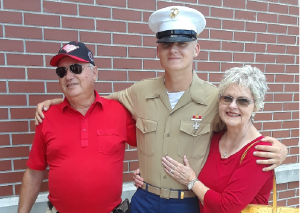News
A Heart for Hospice: Celebrating Our Nurses During National Nurses Week
Each year, National Nurses Week is celebrated in May, beginning on May 6th and ending May 12th, Florence Nightingale’s birthday. This week is a celebration of the nursing profession and of the dedicated men and women who provide care and support to patients and families around the world. Our Agape Care family includes nearly 300 nurses across our branches in South Carolina and Georgia, and each one helps us to live out our mission: to serve with love, providing comfort and support through compassionate care and meaningful experiences. To help celebrate our heroes, we wanted to share more about what it’s like to be a hospice nurse.
When it comes to being a hospice nurse, you can count on one thing: A typical day is anything but typical. Along with being flexible, having the ability to multitask is essential to the job — which, at Agape Care, can involve everything from visiting patients in the field to triaging calls behind the scenes.

Michelle Steele, an RN based out of Agape Care’s North Charleston branch, usually sees about six patients a day. But while making those visits, she also has to be ready to address any issues that may arise with patients she isn’t scheduled to see. “That one call,” she says, “can change your whole day.”
For Dott Clary, a nurse case manager at Agape Care’s Spartanburg branch, always being prepared is crucial to handling anything the day may bring — or, as she puts it: “Don’t walk in as dumb as a rock.”
Each morning, Dott — who, at 74, says she just might be the company’s oldest nurse — reviews her notes and patient files. Taking that extra time to understand her patients’ needs can help them feel more at ease. “You want them to feel like you know who they are,” she says. “It’s important to spend time with the person you’re taking care of. You listen to what they have to say and try to help in every way possible that you can. I think that really goes a long way with connections.”
For Dott and Michelle, forming meaningful relationships is an important part of hospice care, which is available to anyone who no longer benefits from, or has chosen to forgo, curative treatment. “You build a connection with the patients and their families when they’re at the most vulnerable,” Michelle says. “It’s making sure you keep your patient comfortable and also are supporting the primary caregivers — people don’t realize the stress on the primary caregivers until they’re in that situation.”
This time can often be an overwhelming and emotional, and at Agape Care, the goal is for patients and loved ones to be able to focus on days filled with life instead of illness. Nurses are an essential part of a patient’s care team, whose primary goal is pain and symptom management. Along with providing care, which includes assessment, planning, and evaluation of a patient’s needs, nurses also maintain open communication between the physician and the rest of the hospice team.
Working as a hospice nurse can be challenging — Michelle says she finds people either like it or they don’t — but many in the profession feel they’ve both found their calling and the ability to profoundly impact the lives of others. “When I started, I didn’t know if I’d be able to handle patients’ deaths, but what I’ve come to find out is that can be the most peaceful part,” says Michelle, who spent seven years as a dialysis tech before enrolling in nursing school. “You have to be compassionate and caring; you want to be there to support that patient and then also support their loved ones.”

Both Dott and Michelle have also found that there can be misconceptions surrounding hospice — that it might mean giving up, for example — and that people are often reluctant to enroll in care because they don’t understand the peace and comfort it can provide.
According to the National Hospice and Palliative Care Organization (NHPCO), only about half of people use their hospice benefit, and 27.9% of patients in hospice care are only enrolled for seven days or less. But when a patient enters hospice earlier on, Michelle says, you can “build that report and relationship from the beginning with both the patient and the caregivers and explain what will be done to keep a patient comfortable.”
Looking out for a patient’s needs, whether they’re physical or emotional, is always the top priority. But this year, with the COVID-19 pandemic, it’s also been especially important for nurses and other health care workers to pay attention to their own well-being.
As they’ve dealt with increased workloads, PPE shortages, and other unprecedented challenges, health care heroes have found themselves both physically and emotionally drained, and self-care and mental health has become more important than ever. “You have to take care of yourself,” Dott says. “How we are spills over into all of the care that we give and into our environment.”
For Dott, leaning on her faith and the power of prayer is essential to keeping her from burning out physically, emotionally, and spiritually. Michelle has found comfort in knowing she can continue to be there for those dealing with difficult circumstances.
And despite the challenges, their resiliency and compassion have carried them — and so many other nurses — through, allowing them to be there for patients, families, and teammates alike. “I knew I was going to be a nurse; I just knew that in my heart even as a child,” Dott says. “And when it’s in your heart, when it’s in your DNA, you’re going to pull through. You’re going to keep going.”
If you would like to learn more about a career in hospice nursing, please visit: https://agapecaregroup.com/join-our-team/

